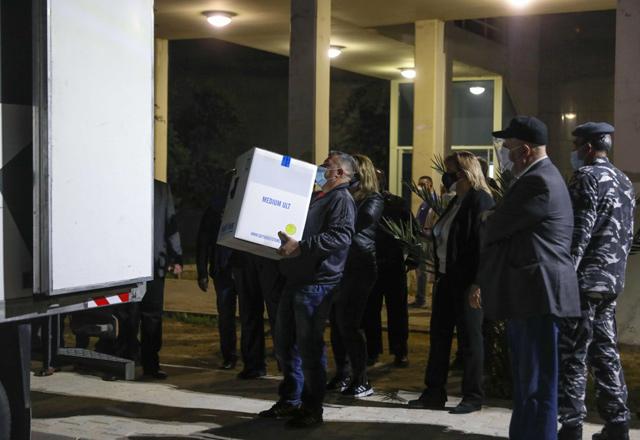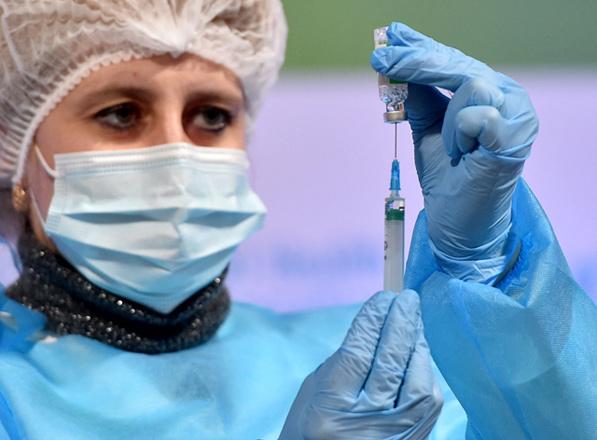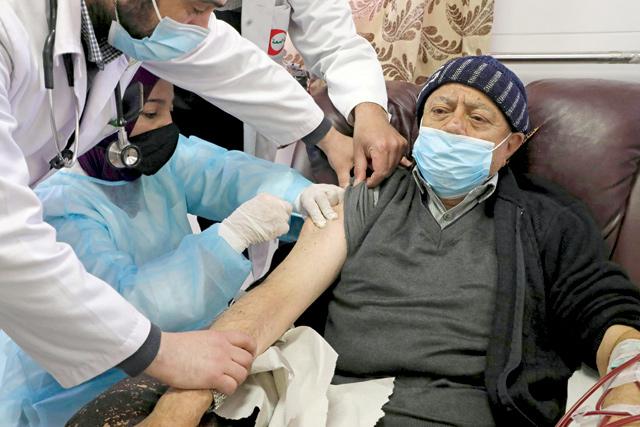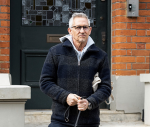You are here
Crisis-hit Lebanon kicks off COVID-19 vaccinations
By AFP - Feb 14,2021 - Last updated at Feb 14,2021

A member of the healthcare staff receives a dose of the COVID-19 Pfizer/BioNTech vaccine at Lebanon's American University Medical Centre in the capital Beirut, on Sunday, as the country kickstarts its inoculation campaign (AFP photo)
BEIRUT — Lebanon kicked off COVID-19 vaccinations on Sunday with jabs for healthcare workers and the elderly in an inoculation drive it hopes will keep the outbreak in check amid a deepening economic crisis.
The country has been under lockdown since mid-January, after an unprecedented spike in cases blamed on holiday gatherings forced overwhelmed hospitals to turn away patients.
Medical workers and those aged over 75 were the first to receive Pfizer/BioNTech shots at three major Beirut hospitals, a day after a shipment of 28,500 doses arrived at the capital's airport.
The World Bank has allocated $34 million to inoculate an initial two million of Lebanon's 6 million inhabitants.
"Finally there's a glimpse of hope that things will get back to normal," said medical student Dana Chatila, who was waiting in her white lab coat and mask outside the American University Medical Center, where she works in the emergency department.
"It's going to take time of course, but the darkness is ending."
The pandemic has compounded the woes of Lebanese, who are struggling with a dire economic crisis and still reeling from Beirut's massive port blast last summer that killed more than 200 people and destroyed swathes of the capital.
More than half the population lives in poverty and rights groups have warned millions will struggle to survive without help if coronavirus restrictions last too long.
Caretaker prime minister Hassan Diab said: "We hope to reach adequate community protection so life can gradually return to normal in Lebanon as soon as possible."
'Beginning of the end'
The first jab was given to Mahmoud Hassoun, head of the intensive care unit at Rafik Hariri Hospital, which has been at the forefront of battling the outbreak.
"Hopefully this will be the beginning of the end of this plague in the country," he told AFP.
The second to roll up his shirt sleeve in front of the cameras was popular Lebanese comedian Salah Tizani, 93, known by his stage name Abu Salim.
“I’m telling everyone to come and get vaccinated,” he said. “Better to get vaccinated than to be knocked down by this deadly virus.”
Bed occupancy in COVID-19 intensive care units countrywide stood at more than 89 per cent on Friday, the World Health Organisation says.
Among those vaccinated by early afternoon were more than 100 people over the age of 75, health ministry adviser Mohamad Haidar said. From Monday, some 18 hospitals across Lebanon would be taking part in vaccinations, he added.
Authorities say 336,992 people have caught COVID-19 since February 2020, of whom 3,961 have died.
Lebanon has ordered around six million vaccine doses in total, including two million from Pfizer/BioNTech and another 2.7 million via the international Covax distribution programme.
The World Bank and the International Federation of Red Cross and Red Crescent Societies are to monitor the vaccine rollout.
No government
Some 450,000 people have signed up to be vaccinated in Lebanon, including 45,000 aged over 75 and 17,500 health sector staff, caretaker Health Minister Hamad Hassan said.
He has promised all residents would be vaccinated, including Syrian and Palestinian refugees living in the country.
But many in Lebanon are still hesitant to get the jab.
Of 500 people surveyed by private think-tank Information International, 31 per cent said they would get vaccinated, 38 per cent said they would rather not and 31 per cent were undecided.
Lebanon’s government stepped down after the August 4 port blast but remains in a caretaker capacity, as a deeply divided political class has since failed to agree on a new Cabinet.
Lebanon desperately needs the new government to start sweeping reforms and unlock billions of dollars in international aid.
Saad Hariri, who returned as premier designate in October, almost a year after he stepped down under street pressure, said he wanted a “government of experts not affiliated with political parties”.
“Whoever prevents the government from being formed prevents reforms from being launched, delays stemming the collapse... and prolongs the suffering of Lebanese,” he said after weeks in which he and President Michel Aoun have blamed each other for the deadlock.
He spoke on the 16th anniversary of the assassination in Beirut of his father, former premier Rafic Hariri.
Related Articles
BEIRUT — Lebanon on Saturday received its first vaccines against the coronavirus, a day before an inoculation drive kicks off in the crisis-
GENEVA — The EU's medicines regulator said onTuesday there was so far "no indication" the AstraZeneca vaccine causes blood clots, urging cou
RAMALLAH, Palestinian Territories — Thousands of Palestinian health workers, the elderly, and patients with cancer or kidney disease were se


















